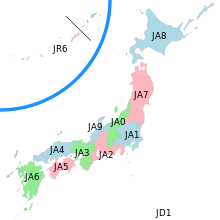Call signs in Japan
Call sings in Japan are unique identifiers for telecommunications and broadcasting.
Call sign blocks for telecommunication
The International Telecommunication Union has assigned Japan the following call sign blocks for all radio communication, broadcasting or transmission:[1]
| Call sign block |
|---|
| JAA–JSZ |
| 7JA–7NZ |
| 8JA–8NZ |
While not directly related to call signs, the International Telecommunication Union (ITU) further has divided all countries assigned amateur radio prefixes into three regions; Japan is located in ITU Region 3. The ITU and CQ Magazine have divided these regions into zones. The main islands of Japan are in ITU Zone 45 and CQ Zone 25. Outlying islands can have differing zones, see the following table:
| Island(s) | ITU Zone | CQ Zone |
|---|---|---|
| main islands and Okinawa[2][3] | 45 | 25 |
| Ogasawara Islands[2][4] | 45 | 27 |
| Okino Torishima[2][4] | 45 | 27 |
| Minami Torishima[4][5] | 90 | 27 |
Amateur radio callsign areas
In Japan, amateur radio (ham radio) licensing of operators is regulated by the Ministry of Internal Affairs and Communications (MIC, 総務省 Sōmu-shō) with the Japan Amateur Radio League (JARL, 日本アマチュア無線連盟) acting as a national amateur radio organization.[6] The IARU cites a year 2000 count of licensed ham operators at 1,296,059, out of a total population of 126,925,843.[7][8] The MIC publishes data showing 446,602 licensed stations as of October 2011.[9]
Amateur radio call signs are assigned based on the area of residence, with the country divided into 10 areas as follows (listed from Northeast to Southwest):[10]

| call areas | region | prefixes | number of stations[9] |
|---|---|---|---|
| 8 | Hokkaido 北海道 | JA8–JS8, 7J8, 8J8–8N8 | 40,476 |
| 7 | Tohoku 東北 | JA7–JS7, 7J7, 8J7–8N7 | 43,975 |
| 0 | Shin'etsu 信越 | JA0–JS0, 7J0, 8J0–8N0 | 18,771 |
| 1 | Kanto 関東 | JA1–JS1, 7J1, 8J1–8N1, 7K1–7N4 | 123,739 |
| 2 | Tokai 東海 | JA2–JS2, 7J2, 8J2–8N2 | 61,205 |
| 3 | Kinki 近畿 | JA3–JS3, 7J3, 8J3–8N3 | 54,023 |
| 9 | Hokuriku 北陸 | JA9–JS9, 7J9, 8J9–8N9 | 12,067 |
| 4 | Chugoku 中国 | JA4–JS4, 7J4, 8J4–8N4 | 30,464 |
| 5 | Shikoku 四国 | JA5–JS5, 7J5, 8J5–8N5 | 19,794 |
| 6 | Kyushu and Okinawa 九州・沖縄 | JA6–JS6, 7J6, 8J6–8N6 | Kyushu: 39,512; Okinawa: 2,576 |
Outlying regions use a subset of the allocated prefixes:[11]
| region | prefix |
|---|---|
| Okinawa 沖縄 | JR6, JS6 |
| Ogasawara 小笠原 | JD1 |
References
- ↑ "Appendix 42: Table of Allocation of International Call Sign Series". International Telecommunication Union. 2007-08-16. Retrieved 2012-01-20.
- 1 2 3 "ITU Zone 45 Map". Retrieved 2012-01-20.
- ↑ "CQ Zone 25 Map". Retrieved 2012-01-20.
- 1 2 3 "CQ Zone 27 Map". Retrieved 2012-01-20.
- ↑ "ITU Zone 90 Map". Retrieved 2012-01-20.
- ↑ "Outline of Amateur Radio License in Japan". Japan Amateur Radio League. Retrieved 2012-01-20.
- ↑ "Status Summary of Radio Amateurs & Amateur Stations of the World". International Amateur Radio Union. Archived from the original on 2007-06-28. Retrieved 2011-12-01.
- ↑ "Population Census". Japan Statistics Bureau, Ministry of Internal Affairs and Communications. Retrieved 2012-01-20.
- 1 2 "無線局統計情報" [Radio Station Statistics] (in Japanese). Ministry of Internal Affairs and Communications. October 2011. Retrieved 2012-01-20.
- ↑ "Japan ham radio districts map". Retrieved 2012-01-20.
- ↑ "Japan Ham Radio Prefectures Map". Retrieved 2012-01-20.